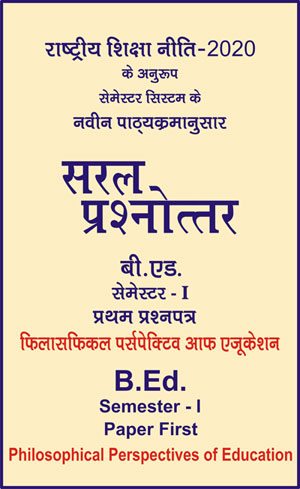Answer -
Naturalism in Education
As a philosophy of education it was developed in the 18th century and was based on the concept of belief in nature. This philosophy firmly believes that everything comes from nature and returns to nature.
The concept of naturalism in education is depicted as a revolt against formalism and stereotyped system of education on. Adams defined naturalism as “a system of training that are not dependent on schools and books but on the manipulation of actual life of the educate.” In naturalism philosophy, education is considered as a process of development of naturalistic life. In the words of Ross, “Education is merely the fostering of the natural development and true education takes place when the nature, power and inclinations of the child are allowed to develop freely with minimum of guidance.” Aristotle, Comte, Bacon, Tagore, Rousseau, Herbert Spencer etc. advocated naturalism philosophy.
Aims of Naturalism in Education
The main aims of naturalism in education is given below :
(1) Natural Environment : It is one of the core aims of naturalism philosophy of education. It advocates to deliver natural environment to children in order to ensure proper development of children at all levels.
(2) Focus on Child : This philosophy considers children as its core element. Teacher should understand the psychology and need of children and thus take actions accordingly. Teacher should consider children as ‘children’ and not as a means of ‘money’.
(3) Freedom : Teacher should give children enough freedom to gain first-hand experience on choice of activities. But should not give too much freedom so as to make misuse of freedom.
(4) Economic Efficiency : Naturalism believes that education should be geared to the fulfillment of economic needs of the child.
(5) Maintenance of Social and Political Relations : Naturalist educators believes that with the help of education, rate of development should increase which in turn will improve social and political justice.
(6) Adjustment with Surrounding : Another aim of naturalism philosophy is to enable an individual to live in harmony with one’s surrounding. This will ensure him/her good health or happiness.
(7) Autonomous Development of any Individual : Naturalism advocates autonomous development of children. Steps must be taken to make children self-dependent.
(8) Enjoyment of Leisure : Another core aims is to give leisure a space in the education system. Without proper enjoyment none can learn or gain knowledge. Leisure or enjoyment help in reducing stress and attaining goals.
Naturalism and Curriculum : According to naturalism, a curriculum should be divided into two parts :

 i
i 










